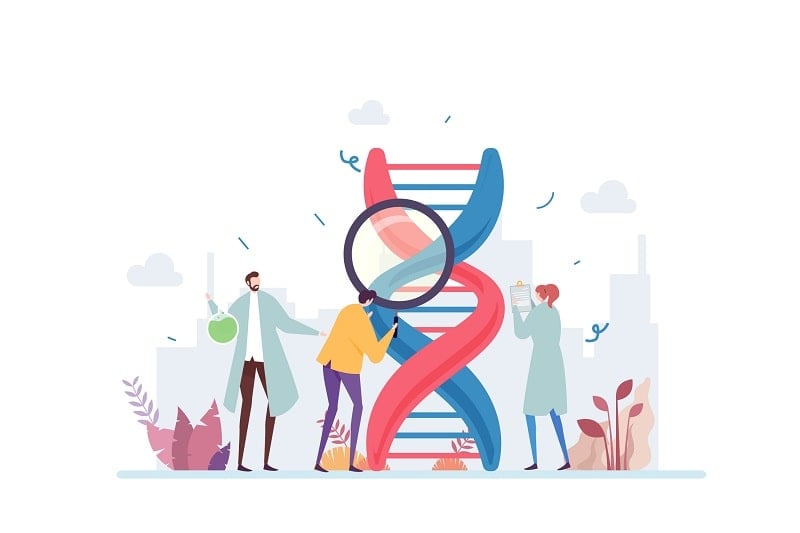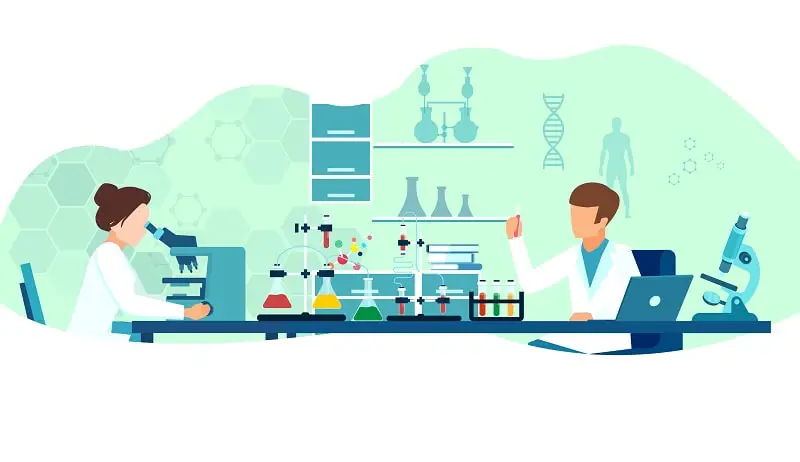What Can You Do With A
Biochemistry Degree
Biochemistry is the study of the chemistry of living organisms and it combines principles from biology and chemistry. Students explore the chemistry behind various biological processes and the function and structure of biomolecules. Biochemistry is used for a variety of purposes, including studying the way foods or substances impact the health of humans or animals and producing healthier new products.
With a Biochemistry degree, graduates gain access to a wide range of career options. Many of the jobs in the biochemistry field involve laboratory work and research. Students may go on to work in the pharmaceutical or agricultural industries. They may also choose to teach biology or chemistry or work with environmental agencies.

Typical employers for Biochemistry graduates







12 Career Options
- Laboratory Assistant
- Biochemist
- Materials Scientist
- Chemical Safety Engineer
- Environmental Chemist
- Chemistry Professor
- Forensic Science Technician
- Medical Scientist
- Technical Support Specialist for Scientific Products
- Pharmacist
- Analytical Chemist
- Medicinal Chemist
What they do
Laboratory Assistant is a common career path for achieving a senior position in the biochemistry field. Laboratory Assistants may work under Biochemists, Analytical Chemists, and other lead Chemists in various industries including environmental research and pharmaceuticals. Their primary job duties include assisting with research and lab work along with administrative tasks such as compiling and organizing research.
How to become one
Many colleges offer Associate’s degree programs in Lab Sciences that prepare students for the job of a Laboratory Assistant. However, obtaining a Bachelor’s degree in a related field can open the doors to future career opportunities. Whether you choose a two-year or four-year program, applying for an internship at a research lab will provide you with clinical experience.
How much they make
.jpg)
What they do
A Biochemist studies the physical and chemical property of cells to help detect how various organisms react to each other. For example, a Biochemist may research the effects of drugs, nutrients, or hormones on various biological processes. Biochemists often work in a laboratory setting and are employed in a variety of industries including food and agriculture, pharmaceuticals, and research labs. Find out more about what is it like working as a Biochemist.
How to become one
Advanced biochemist positions require a Ph.D. However, a Bachelor’s degree or Master’s degree may prepare you for related entry-level positions to gain work experience. After obtaining a B.S. or M.S., consider applying for a research technician job. After obtaining a doctoral degree, you can seek employment as a biochemist.
How much they make
.jpg)
What they do
Materials Scientists study substances at the atomic and molecular levels to understand how they interact with each other. They may help develop new products, improve existing products, and provide research on the effects of various products. Materials Scientists focus on the properties of man-made and natural materials including polymers, glass, ceramic, rubber, alloys, and metals. Find out more about what is it like working as a Materials Scientist.
How to become one
A little over one-third of Materials Scientists entered the field with a Bachelor’s degree. Some individuals enter the field after completing a materials science and engineering (MSE) certification program after obtaining a Bachelor’s degree in an unrelated field. As with many other jobs, a Master’s degree can increase your potential income. A Master’s degree is also necessary for many supervisory positions and research positions.
How much they make
.jpg)
What they do
Chemical Safety Engineers develop procedures and design systems to help protect individuals from illness and injury. For example, a Chemical Safety Engineer may help improve the design of machinery, furniture, chemicals, and other consumer products to make them safer. Job duties include reviewing specifications for new products and correcting potential safety issues.
How to become one
Becoming a Chemical Safety Engineer requires a Bachelor’s degree. Work experience is also attractive to potential employers. Students may gain on-the-job training by accepting internships or entry-level positions in the health and safety industry. Additional coursework in occupational health and safety, engineering, and environmental safety are also recommended due to the engineering component of this job.
How much they make
.jpg)
What they do
An Environmental Chemist monitors water, soil, and air to analyze the impact of chemicals on the environment, humans, and animals. They may also analyze how human behavior affects the environment. Environmental Chemists are often employed to improve conservation and sustainability efforts, working for nonprofits or private businesses.
How to become one
Entry-level Environmental Chemist positions require at least a Bachelor’s degree, typically in environmental chemistry. However, biochemistry, organic chemistry, and chemistry are suitable alternatives. Obtaining a consultant position requires a Master’s degree while research and teaching positions typically require a Ph.D. in environmental chemistry or a related field.
How much they make
.jpg)
What they do
A Chemistry Professor teaches chemistry at the college level. The primary duty of a Chemistry Professor is to teach college students about chemistry. They give lectures and prepare class materials along with developing laboratory projects for students. Chemistry Professors may also conduct their own research and publish their findings in peer-reviewed journals. Find out more about what is it like working as a Chemistry Professor.
How to become one
Most Chemistry Professors at four-year universities and colleges hold at least a Ph.D. in Chemistry. Instructors at community colleges and trade schools may only need a Master’s degree. Professor positions also require teaching and publishing experience, which can be obtained through apprenticeships as a graduate student.
How much they make
.jpg)
What they do
Forensic Science Technicians analyze evidence collected in a crime scene. Unlike crime scene investigators, technicians rarely travel to the scene of the crime. They typically organize and analyze biological or chemical evidence in a lab setting. Forensic Science Technicians may need to analyze bodily fluids, blood splatter, fingerprints, or blood samples. Find out more about what is it like working as a Forensic Science Technician.
How to become one
Forensic Science Technician positions require a Bachelor’s degree in natural science such as chemistry, biology, biochemistry, or forensic science. After gaining an entry-level position, you will likely receive on-the-job training. A wide range of licenses and certifications are also available to aid professional development and improve your credentials but are not required for entry into this field.
How much they make
.jpg)
What they do
A Medical Scientist reviews data from clinical trials and independent research to improve devices and products in the healthcare industry. They may help create and test medical devices, prescription drugs, and health supplements. Medical Scientists also investigate human diseases and work to develop new methods for preventing or treating them. Find out more about what is it like working as a Medical Scientist.
How to become one
Medical Scientists often need a Ph.D. in Biology or a medical degree. Aspiring Medical Scientists typically earn a Bachelor’s degree in Biology or Chemistry before enrolling in graduate school. You do not need a license to work as a Medical Scientist unless you have direct patient contact as part of your job duties.
How much they make
.jpg)
What they do
Technical Support Specialists work for companies that sell highly technical scientific equipment such as medical equipment or laboratory equipment. A Technical Support Specialist assists customers when they experience technical issues with scientific products. The specialist may resolve issues over the phone or travel to workplaces to diagnose and repair broken equipment.
How to become one
Employers tend to prefer candidates with a bachelor’s degree in a related field. However, an Associate’s degree may be sufficient for some entry-level technical support positions. Experience with the types of products for which you will provide technical support is also needed.
How much they make
.jpg)
What they do
Pharmacists typically work at community pharmacies or in the pharmaceutical industry. The main responsibilities of a Pharmacist include advising patients about prescription medications, ensuring that patients receive suitable medications, and educating patients about dosage and potential reactions. In a pharmacy setting, a Pharmacist also handles the ordering of new medicines and various administrative tasks. Find out more about what is it like working as a Pharmacist.
How to become one
To become a pharmacist, you need to earn a Doctorate of Pharmacy degree. Some students choose to enroll in dual-degree pharmacy programs, which include two years of pre-professional study and four years of professional pharmacy study. If you obtain a Bachelor’s degree in Biochemistry, you can enroll in a two-year pharmacy graduate program.
How much they make
.jpg)
What they do
Analytical Chemists analyze the biological and chemical properties of samples using a variety of software, equipment, and techniques. Analytical Chemists tend to specialize in specific areas such as toxicology, quality control, pharmaceuticals, and forensics. Job duties often include reporting research results, writing research papers, and ensuring that companies follow health and safety standards. Find out more about what is it like working as a Chemist.
How to become one
You need a Bachelor’s degree in Chemistry, Physics, or a related field to obtain an entry-level position, such as an assistant or technician. Most employers also prefer candidates with extensive lab experience, which you can get through internships or work-study programs during college.
How much they make
.jpg)
What they do
Medicinal Chemists help research and develop the chemical compounds used in pharmaceutical drugs. They also analyze the effectiveness of compounds for treating various medical issues. They typically work for pharmaceutical companies as part of a team of other engineers and scientists to create more effective drugs.
How to become one
A Bachelor’s degree is needed for research technician positions, which are the traditional path to becoming a Medicinal Chemist. However, most companies require a Ph.D. and at least two years of postdoctoral experience for full-time medicinal chemists.
How much they make
.jpg)









